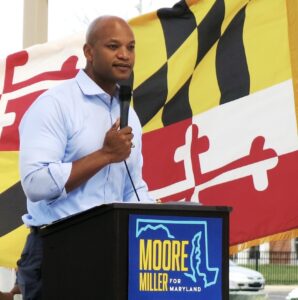Governor Wes Moore, Attorney General Anthony Brown, and Comptroller Brooke Lierman were successful in getting some or all portions of their first legislative packages passed by the 2023 General Assembly.
The following summarizes where each leader’s package stands as of April 13, 2023, after the 2023 General Assembly has adjourned.

Governor Wes Moore
Bills presented by Governor Wes Moore
Governor Wes Moore introduced a package of bills designed to help and honor Maryland’s veterans, everyday workers, and youth.
One of Governor Moore’s core tenants throughout his campaign and as he entered office has been elevating service. Through an executive order, he initially created the Maryland Department of Service and Civic Innovation which would oversee Maryland’s year of service option for high school graduates. The Department was reestablished through legislation and was made more robust by adding oversight of the Maryland Corps Program to its purview. The legislation realizes Governor Moore’s goals of elevating youth service and alternative pathways from education to employment.
As introduced, the veteran bills would have provided $35 Million in support. As passed, they provide a more modest but still substantial boost to Maryland military members and their families. When Governor Moore testified on HB 544, it marked the first time since 2014 a sitting governor in Maryland testified in support of their bill.
The Governor’s package also included legislation aimed at economically helping everyday workers and their families by increasing their wages and permanently extending and expanding the earned income tax program.
HB 544/SB 553 – Income Tax – Subtraction Modification for Military Retirement Income (Keep Our Heroes Home Act)
As passed the bills increases the military retirement income tax subtraction modification from $5,000 to $12,500 for individuals younger than age 55 and from $15,000 to $20,000 for individuals aged 55 and older. The bills passed both chambers and will be signed by the Governor.
HB 553/SB 554 Maryland National Guard – Tricare Premium Reimbursement Program – Establishment (Health Care for Heroes Act of 2023)
This bill establishes a TRICARE Premium Reimbursement Program. Under the program, members of the Maryland National Guard may be granted up to $60 per month to cover premiums under the TRICARE Reserve Select or the TRICARE Dental Programs. The Senate bill passed both chambers and will be signed by the Governor.
HB0546/SB0551 Department of Service and Civic Innovation and Maryland Corps Program Service Year Option Pathways – Established (Serving Every Region Through Vocational Exploration Act of 2023)
This bill establishes the Department of Service and Civic Innovation (DSCI) and statutorily transfers oversight of both the Governor’s Office on Service and Volunteerism and the Maryland Corps Program to the new department. Through these legislative actions, Maryland high school students will have multiple pathways to engage in service. Participants will be provided with placements and support in the form of professional development, job training, and mentorship. The Senate bill passed both chambers and will be signed by the Governor.
HB 547/SB 552 Family Prosperity Act of 2023
This bill permanently extends the temporary expansions of the Maryland Earned Income Tax program made by the General Assembly in 2021. Those expansions included increasing the value of the State refundable credit and expanding the eligibility for Maryland’s earned income credit to taxpayers. The bill also eliminates the $530 limit on the State refundable tax credit for individuals without qualifying children. The bills passed both chambers and were signed by the Governor on April 11, 2023.
HB 549/SB 555 Fair Wage Act of 2023
As introduced, his legislation would have accelerated the minimum wage to $15 per hour as of Oct. 1, 2023. As passed, this bill increases the State minimum wage to $15 on January 1, 2024. This increase will apply to all employees (businesses with 15+ employees and those with less than 15 employees) and will be implemented a year ahead of when the increase to $15 was to occur under current law. The bill also removes phase-in requirements remaining from previously passed legislation. The Senate bill passed both chambers and was signed by the Governor on April 11, 2023.

Attorney General Anthony Brown
Bills presented by Attorney General Anthony Brown
Attorney General Anthony Brown kicked off his term with a package of bills intended to expand the powers of the Office of the Attorney General. His top two priorities included a bill that would grant the AG with authority to enforce federal and state civil rights laws and another that would enable him to enforce civil action to remedy unlawful patterns and practices actions committed by particular government officials. His third priority focused on updating false claims acts. AG Brown was successful in getting one of his three priorities passed.
HB 772/SB 540 Human Relations – Civil Rights Enforcement – Powers of the Attorney General
This bill grants the AG the authority to investigate, prosecute, and remediate civil rights violations and creates a Civil Rights Enforcement Fund. The AG may use this authority to pursue civil action in cases where there is “reasonable cause to believe that a person is engaged in discrimination under the U.S. Constitution, the Maryland Constitution, or State or federal law.” The AG may not use this authority on behalf of any individual or against state or local governments, political subdivisions, or employees acting under the color of law. The Senate bill passed out of both chambers and is expected to be signed by the Governor.
HB 771/SB 658 Human Relations – Patterns and Practices of Civil Rights Violations – Remedies
This bill would have prohibited government agencies and agents from engaging in a pattern or practice of conduct that violates a person’s civil rights under the U.S. Constitution, the Maryland Constitution, or State or federal law. The prohibition applies to law enforcement agencies, state behavioral health facilities, correctional facilities, and immigration detention facilities as well as the Division of Corrections, the Division of Parole and Probation, and the Department of Juvenile Services. It also authorizes the AG to pursue civil actions against patterns and practices violators for equitable or declaratory relief. The bills did not make it out of committee.
HB 773/SB 666 Maryland False Claims Act and Maryland False Health Claims Act – Revisions
This bill would have strengthened whistle-blower protections under the Maryland False Claims Act (MFCA) and the Maryland False Health Claims Act (MFHCA). Under the current laws, individuals are prohibited from knowingly making false or fraudulent claims for payment from government entities or state health plans and programs. An individual can pursue legal action against these false or fraudulent claims “qui tam” or on behalf of the government. The bills would have allowed for individual claims to continue even if the government has chosen not to intervene and established processes for if the government chooses to intervene later. The bills did not make it out of committee.
HB 857/SB 290 Office of the Attorney General – Independent Investigations Division – Authority to Prosecute
While not part of the AG’s package, another set of bills sponsored by Senator Smith and Delegate Clippinger will expand the investigative and prosecutorial authority of the Independent Investigations Division (IID) of the AG’s Office. Under the bill, IID is the primary unit for investigating and prosecuting police-involved deaths of a civilian or incidents that result in serious bodily injury of a civilian. The Senate bill passed both chambers and will be sent to the Governor for signature.

Comptroller Brooke Lierman
Bills presented by Comptroller Brooke Lierman
Comptroller Brooke Lierman presented the General Assembly with a package of bills geared towards modernizing the office and ensuring that its programs are more equitable and accessible to taxpayers.
HB 708/SB 661 Unemployment Insurance – Tax Parity for Delayed Unemployment Insurance Payments
This bill would have created a rebate program in the Comptroller’s Office to remedy tax issues individuals experienced after delays with the unemployment insurance program under the RELIEF Act resulted in them receiving the benefits in 2022 after applying for them in 2020 or 2021. Essentially, these individuals were forced to pay taxes on a benefit that was earned in a previous year but not received until the following year. The rebate would have covered the exact amount of taxes those individuals paid. While the Senate bill crossed over to the House, the bill did not make it through to final passage.
HB 709/SB 659 21st Century Financial Systems Council-Establishment
This bill directs the Office of the Comptroller, Office of the Treasurer, the Department of Budget and Management, the Department of Information Technology, and the Department of General Services in consultation with the Modernize Maryland Oversight Commission (MMOC) to collaborate on managing and implementing the transition to a new, state government-wide, cloud-based financial management, and accounting system – the 21st Century Financial Systems Enterprise. The bills passed both chambers and were signed by the Governor on April 11, 2023.
HB 707/SB 660 Office of the Comptroller – Taxpayer Advocate Division
This bill creates the Taxpayer Advocate Division in the Office of the Comptroller. The division is largely tasked with assisting taxpayers and their representatives to understand, navigate, and resolve problems with the Office. The division will also assist the Office in identifying and rectifying systemic problems. The bills passed out of both chambers and are expected to be signed by the Governor.
For more information:
- Governor Moore Highlights Legislative Agenda to Support Veterans, National Guard Members, and their Families – Press Releases – Office of Governor Wes Moore (maryland.gov)
- Governor Moore Testifies Before House Ways and Means Committee in Support of The Keep Our Heroes Home Act – Press Releases – Office of Governor Wes Moore (maryland.gov)
- Governor Moore Signs Executive Orders on Ethics and Creation of the Maryland Department of Service and Civic Innovation – Press Releases – Office of Governor Wes Moore
- Governor Moore Testifies in House and Senate Hearings in Support of the SERVE Act – Press Releases – Office of Governor Wes Moore (maryland.gov)
- Governor Moore Hosts Community Roundtable, Testifies in House Hearings in Support of the Fair Wage Act – Press Releases – Office of Governor Wes Moore (maryland.gov)
- Brown pursues a more expansive scope for attorney general’s office with civil rights, pattern-or-practice legislation – Maryland Matters
- Bill to give Maryland AG the authority to prosecute police brutality heads to Gov. Wes Moore – Baltimore Sun
- News Release: Comptroller Lierman’s Three Legislative Priorities Successfully Crossover in the General Assembly (govdelivery.com)




